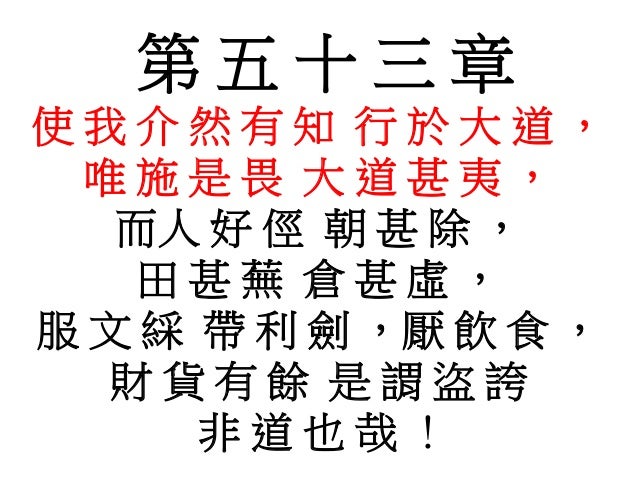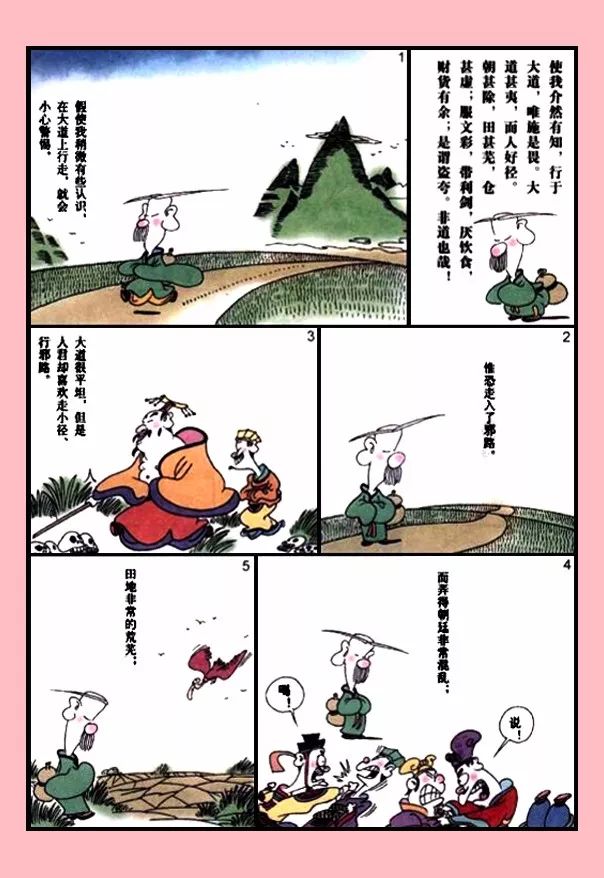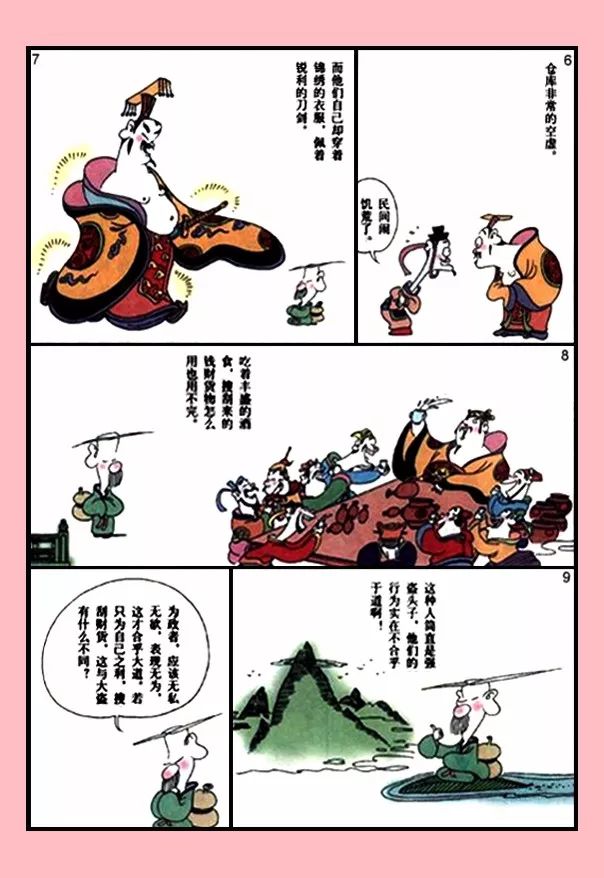
| 53 | 道德經: | 大道甚夷,而民好徑。 朝甚除,田甚蕪,倉甚虛;服文綵,帶利劍,厭飲食,財貨有餘;是謂盜夸。 非道也哉!  |
| Dao De Jing: |
If I were suddenly to become known, and (put into a position to) conduct (a government) according to the Great Dao, what I should be most afraid of would be a boastful display.
The great Dao (or way) is very level and easy, but people love the by-ways.
Their court(-yards and buildings) shall be well kept, but their fields shall be ill-cultivated, and their granaries very empty. They shall wear elegant and ornamented robes, carry a sharp sword at their girdle, pamper themselves in eating and drinking, and have a superabundance of property and wealth; - such (princes) may be called robbers and boasters. This is contrary to the Dao surely!
|


Dao De Jing Chapter 53 - Seddon
Jan 4 at 5:40 AM
53
Having just a little intelligence
I would keep to the main road,
My only fear that I might stray from it.
It is easy to keep to the main road,
But people prefer by-ways.
When the court is maintained in lavish splendour,
The fields are full of weeds
And the granaries are empty.
Some wear extravagant clothes
And carry sharp swords.
They consume food and drink to excess
And accumulate more wealth and possessions than they can find a use for.
This is called robbery and extravagance,
And is contrary to Tao.


第五十三章五十四言
【文】
傅奕《道德经古本篇》第五十三章
使我介然有知,行於大道,惟施是畏。大道甚夷,而民好径。朝甚除,田甚芜,仓甚虚。服文采,带利剑,厌饮食,货财有余。是谓盗夸,盗夸非道也哉。
帛书《老子》甲本复原第16章
使我(扌絜)有知,行于大道,唯他是畏。大道甚夷,民甚好解。朝甚除,田甚芜,仓甚虚。服文采,带利剑,厌食而资财有余,是谓盗夸。盗夸,非道也。
【字】
他:古代汉语里不分人与物,都可以用。
除:《说文》殿阶也。。按,阶级如山石之高下,故从阜。
厌:饱,满足。后作“餍”
盗夸:犹盗魁。指取富贵或名位不以其道者。
【校】
介然:帛书无“然”字,“介”甲本作“扌絜”。乙本同“介”。
惟施是畏:帛书甲本残,乙本作“惟他是畏”。
径:帛书甲本作“解”,乙本作“懈”。
货财:王弼本作“财货”,帛书甲本残,乙本作“资财”。
【注】
批时政。
【译】
让我有知道了并用于大道,只怕他。大道很是平坦,黎民很喜欢懈怠。朝堂阶级很高,土地很荒芜,仓库很空虚。穿穿着华丽,带着利剑,满足于饮食,钱财物资有富余,这是大盗。大道不是“道”。
【解】
“扌絜”和“介”高明均读“絜”,引申为掌握、持握。假使我掌握了知识。可借鉴。
介:《传》介谓辨别之端。《说文》画也。按八者分也。从人者,取人身之左右以见意。
絜,度量;矩,画直角或方形用的尺子,引申为法度、规则。不能确认古本到底是哪个字,两个字本义在此又都读不通,个人愚见,这个字似乎没有左右句意的重要性,即使不解读也无关系。
【文】
傅奕《道德经古本篇》第五十三章
使我介然有知,行於大道,惟施是畏。大道甚夷,而民好径。朝甚除,田甚芜,仓甚虚。服文采,带利剑,厌饮食,货财有余。是谓盗夸,盗夸非道也哉。
帛书《老子》甲本复原第16章
使我(扌絜)有知,行于大道,唯他是畏。大道甚夷,民甚好解。朝甚除,田甚芜,仓甚虚。服文采,带利剑,厌食而资财有余,是谓盗夸。盗夸,非道也。
【字】
他:古代汉语里不分人与物,都可以用。
除:《说文》殿阶也。。按,阶级如山石之高下,故从阜。
厌:饱,满足。后作“餍”
盗夸:犹盗魁。指取富贵或名位不以其道者。
【校】
介然:帛书无“然”字,“介”甲本作“扌絜”。乙本同“介”。
惟施是畏:帛书甲本残,乙本作“惟他是畏”。
径:帛书甲本作“解”,乙本作“懈”。
货财:王弼本作“财货”,帛书甲本残,乙本作“资财”。
【注】
批时政。
【译】
让我有知道了并用于大道,只怕他。大道很是平坦,黎民很喜欢懈怠。朝堂阶级很高,土地很荒芜,仓库很空虚。穿穿着华丽,带着利剑,满足于饮食,钱财物资有富余,这是大盗。大道不是“道”。
【解】
“扌絜”和“介”高明均读“絜”,引申为掌握、持握。假使我掌握了知识。可借鉴。
介:《传》介谓辨别之端。《说文》画也。按八者分也。从人者,取人身之左右以见意。
絜,度量;矩,画直角或方形用的尺子,引申为法度、规则。不能确认古本到底是哪个字,两个字本义在此又都读不通,个人愚见,这个字似乎没有左右句意的重要性,即使不解读也无关系。
作者:孤鸿学士


No comments:
Post a Comment